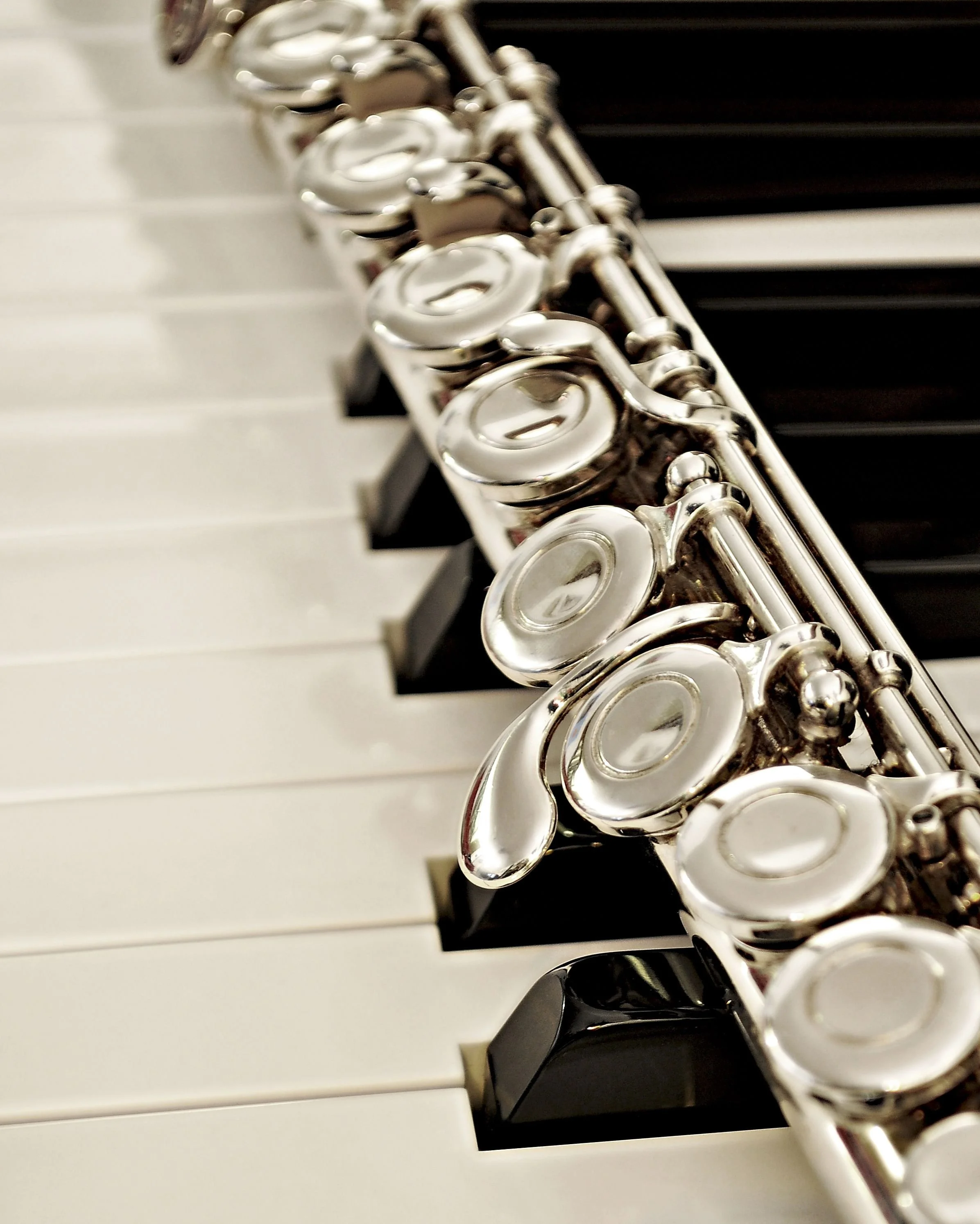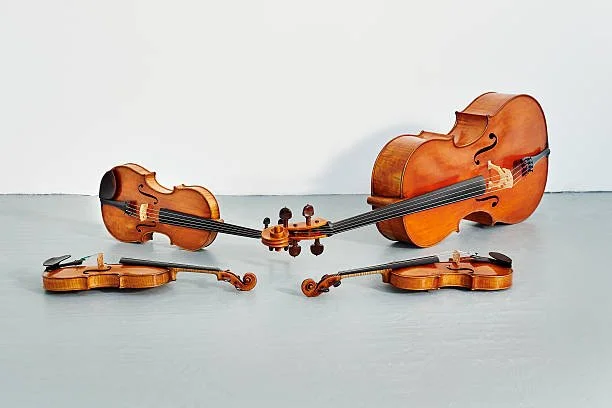Just another brief note here. As you can tell, I’ve been doing some cleanup around here. The page for the quintet had some problems and I’ve fixed them and added a video to boot. The mix is new and should sound more natural. So if you haven’t visit the page (and especially if you have) it’s right here.
Updated recording and video of Spidgin (for flute and piano)
It’s been far too long since I’ve posted, but it’s been a busy time. I’ve recently finished a bit of chamber music and a new symphony. It might take a while to get anything posted about that. So in the meantime, you can hear a new mix of Spidgin and watch it with score on Youtube. Just go right here for more.
Trumpet Concertino -- A fresh revision of an older piece.
I wrote this little concertino back in 1986. It was performed in Boston by Alea III, under th baton of Theodore Antoniou. The soloist was Joseph Foley. The piece comes from a time before computer notation programs, so I only had an ink copy. I had fond memories of it and had long intended to computerize the score and perhaps make a few small corrections here and there. But as I looked at the score, I realized that the orchestration showed my inexperience at the time. The general sense of orchestration was promising, but far from complete. So this new version should be considered as the completion of an older sketch. Instrumentation is the same, except that I moved the mallet parts to a separate player. The earlier version (what I now consider as the sketch) had mallets covered by one of the percussionists. While there is some amusement in observing a player covering so many parts in such a short time, it’s not very considerate. There’s still plenty on everyone’s plate.
There is always a danger of a composer revisiting an older piece. There is a strong temptation to ‘recompose’ the music, moving it into the composer’s mature style and possibly losing the original intent. That’s not what I’ve done: it’s exactly the same piece—just properly orchestrated. The piece is something of a musical mirror. There’s a hint of that in the fact that it ends as it began, with slow, mysterious music. But the harmony and melodies are all reflections around the pitch of G: Harmony below G is an inversion of the harmony above. Some thing goes for the tunes. The result is an uncertain sort of tonality. I’ve not done another piece around this idea, although I possibly should.
At any rate it’s an enjoyable piece from a much younger me.
Recording (and revision) of Three Scenes for Woodwind Quintet
Back in spring of 2023, I completed a woodwind quintet. It was quickly programmed on a chamber music series in Salt Lake City (Intermezzo Chamber Music) and given its premiere on July 31 of 2023. Players were excellent. As with many first performances, it’s rocky in spots, but still worth a listen.
I also realized that there were a few small modifications I needed to make in the first movement and I’ve done that.
If you visit the page for the piece here you can listen to the first performance. You can also see a video of the revision while following the score.
At some point there will be a full video of the first performance as well, although I’m not sure when that will be. I’ll post a link whenever that time comes.
New Video of Acellorimba
In early July, there was a fine performance of one of my older pieces: Acellorimba for cello and marimba. The performers were:
Karen Kaderavek - cello. This piece was written for Karen, along with Nancy Zeltsman. They gave the original performance in 1985
Sebastian Buhts - marimba. Sebastian is a rising star on marimba and I’m delighted he’s part of this performance.
We’re fortunate that there was a nice video capture, along with an audio recording. So you can now enjoy a summer moment in upstate New York. To learn more about the piece, please visit its page.
2023 performance of Acellorimba by Michael Carnes. Performers are Karen Kaderavek and Sebastian Buhts.
Finishing Up the Audio Recording Part of Life
I began recording classical music around 1980 or before. In the beginning it was music of my own: performances that wouldn’t have been captured otherwise. I had a lot to learn! But by10 years later, I was developing some skill. Groups began to ask me to record their concerts. It was always mainly avocational—a way of giving back to the community. I charged for really big projects, but I made it a point not to take on many of those. I used many recordings to improved the reverbs I wrote when I was Exponential Audio.
I’ve had some great advice along the way, and I’ve shared some of what I’ve learned on this website. I’ve recorded lots of superb musicians—some well known around the world. But as I’ve become more involved in composing again I’ve realized there simply isn’t time to do recording any more. Dragging equipment around (getting there early and leaving late) and the many unseen hours and days of cleanup and mastering don’t leave me the time I need for writing or family. So I’m calling it a day.
I still have a number of things to record for the upcoming academic year and I’m going to enjoy them. I’m not accepting any new projects and I’ll be finished with all this activity less than a year from now. It’s been quite a ride, but I have other things to do and other places to be.
Many of you who visit my website have come for these technical articles. There might be one or two more, but each one of those takes as much time as a recording project. If you have originally come for those articles, I hope you’ve stayed for the music. I’m planning on much more of that, and you’re always welcome to drop in.
Upcoming performances: Acellorimba for Cello and Marimba
Way back in 1985, I wrote a tricky and fast-moving duo for cello and marimba. It was named, of course, Acellorimba. The performers were Karen Kaderavek and Nancy Zeltsman. You can learn about the piece and hear that first performance here. The premiere was given to a packed house at Sanders Theater on the campus of Harvard
This came during the heyday of my time with Composers in Red Sneakers. Nowadays it’s hard to imagine that a concert of new chamber music could draw a crowd, but Boston was full of ensembles of all sorts and concert-going was part of the fabric of the place. It was hectic: in the space of just a few weeks there were pieces to be composed, rehearsed and premiered. In six weeks, you’d do it all over. The focus, of necessity, was always on the next piece and not the last one. I suppose this was the way it used to be, once upon a time…
I heard from Karen recently to learn that she’s brining Acellorimba back to the stage—this time with marimbist Sebastian Buhts. There will be two performances as part of the Adirondika Pro Musica series, in the beautiful Adirondack region of New York State, nestled right next to Canada If you’re in the area, here’s where you can hear it:
July 6 at 7:30 - Childwold Memorial Presbyterian Church in Childwold NY
July 7 at 7:30 - Adirondack Presbyterian Church in Lake Clear, NY
Other composers on the program are Haydn, Beethoven, Holstein and Mozart. I’m delighted to know this piece will be played by such highly skilled and musical performers.
Upcoming performance: Three Scenes for Woodwind Quintet
I’m happy to let you know that my new woodwind quintet will be getting its first performance this July 31 at Westminster College. The auditorium is one of the nicest spaces for chamber music in Salt Lake City, and the performers are absolutely first-rate. It will be a part of the longstanding Intermezzo series. If you’re in the neighborhood, you’ll be more than welcome. For more information, visit the Intermezzo site.
Spidgin, a short and flashy piece for Flute and Piano
Perhaps you haven’t been introduced to Spidgin. It dates to 2007. I’ve always envisioned Spidgin as a perfect little encore piece. It’s fast, flashy and virtuosic. the flute and piano chase each other around the score, only lining up together on a few occasions over its two minute span.
It also holds an unusual position in my oevre. I was camping down in southern Utah, enjoying astronomy under dark skies with friends. I got a call telling me the piece was being played in Salt Lake City that day. I’d known nothing about it—hadn’t been to rehearsals, gotten a concert notice, nothing. And there simply wasn’t time to dash back up to SLC and take a much-needed shower. I know it was performed, since I saw a review in a local paper a day or two after. But I wasn’t there and no recording was made. I have plenty of other pieces that were performed and un-recorded. But never a premiere. So, for now, I have a nice rendering instead. Please listen to it here.
Then: for those who are no more
This is a sort of memento mori, written in 2021 during the still-growing wave of Covid. My original intention was to write a sort of memorial piece for those who had been taken by this disease. But I expanded it to take note of all the dead everywhere: all who had once lived but are no more. The only thing stranger than death may be life itself. There is a time in life when we experience the world as ourselves. We think what we think, see what we see, and experience a panoply of emotions.
At death, that all ends. But we still live in a more indirect way in the thoughts and memories of those who knew us. But in time they pass, and perhaps we still appear in family histories with an even dimmer glow. And at some point that’s gone as well. But all of us, present and past, are likely to have some recollection of a time we were most alive. We think of that as Then.
This piece has not yet received a performance, but I hope that changes before long. For now, you’re welcome to listen to a high-quality digital rendering






